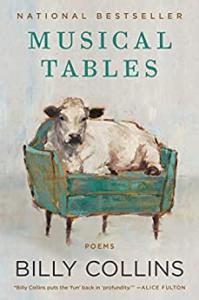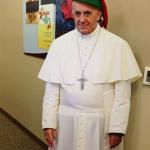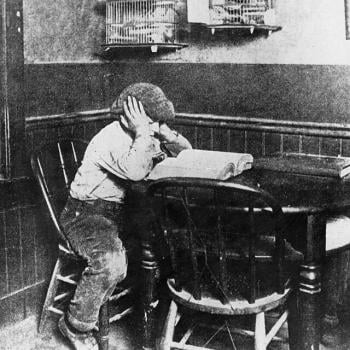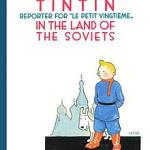There are way too many interesting sounding books for me to ever read being published on a regular basis. I don’t have the time nor the attention span to sit through most of the books I come across. But that doesn’t stop me from learning about what books are out there and perhaps taking a small sip from it’s pages. Well here is a taste of some of the newer books that have come out in the world in the last several months of 2022.
I have divided the books into 3 sections. Book that have been published from my fellow Catholics.
Made up worlds and stories from the world of Fiction, some who happen to be devout practicing Catholics.
Books that touch on various different topics that you would find in the non-fiction section of your public library or bookstore.
Of course there are more books out there then what I’ve put in this blog post, but this has what has caught my eye when I went browsing. So browse through yourself and perhaps you’ll find something new to read, either borrowing it from a friend or the library or else purchasing your own copy.
Catholic
This Book is one of my Christmas Gift From My Wife-
The divine flows through the ordinary stuff and ordinary moments of life. Even a naturalist such as Thoreau understood that. “God himself culminates in the present moment,” he wrote in Walden.
God is one of us. The Incarnation binds us irrevocably to him. “Human drives, desires, function and needs are the place of divine revelation and encounter,” says Fr. Bryan Massingale, writer and professor. “The early Church authors were convinced that Christ became human so that the human could be the avenue to God.”
The Catholic impulse, woven into the hearts of the faithful, directs our thoughts and actions and makes us co-creators of society. Saint Paul exhorted: “Whatever is true, whatever is honorable, whatever is just, whatever is pure, whatever is lovely, whatever is gracious, if there is any excellence, if there is anything worthy of praise, think about these things.” Catholics have thought on these things for two thousand years, and the results are manifest in our quotidian lives.
150 People, Places, and Things You Never Knew Were Catholic by Jay Coop
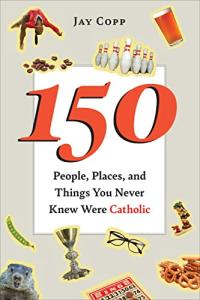
I believe that the Lord, in his wisdom, has surrounded you with current opportunities to think deeply. You can fan the flame of thought in the mountains on a hike, in a library buried in a stack of books, while you nurse your infant child, watching the storylines of your favorite sitcom unfold, or while doing the thing you do each day that you call “work.” We must realize that the pursuit of God is not confined to any framework precisely because he pursues you tirelessly in every single moment of your life.
With All Her Mind: A Call to the Intellectual Life by Rachel Bulman (2022)
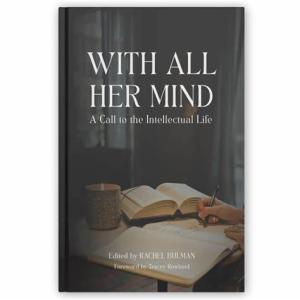
At first I thought the blog would be a virtual soap box, and I hoped a few curious bystanders might show up to watch. But it quickly became more of a pub. Others starting taking their turn at the mic. We told our stories—the true stories, the hard stories, the ones that you feel you probably shouldn’t share in Church, at least not outside the confessional. We confessed our love for a faith we often found embarrassing. We excavated our unabashedly weird Catholic imaginations for mystery and magic. And as more and more pilgrims began to stumble in, we started propping each other up, linking arms and walking together. The blog grew into a community of writers and artists and thinkers and reluctant believers.
This book, we hope, will take you on a journey too. We’re going to tell you the stories of how we’ve found ourselves, despite our tendencies to wander. Some of us were drawn deeper into the Church. Some of us were ultimately repelled by what we found. But we continue on in pursuit of the mystery of faith.
Sick Pilgrims: An anthology of Catholic Spiritual Autobiography by Jessica Mesman and Rebecca Bratten (2022)
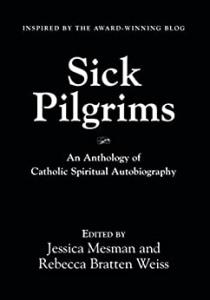
ended. Sola scriptura means that every preacher with an opinion and the ability to gain followers has the potential to start a new religious group, and that is exactly what has happened in the centuries since. Some of the more successful innovators have included John Knox (founder of the Presbyterians), George Fox (Quakers), Menno Simons (Mennonites), Robert Brown (Congregationalists), Michaelis Jones (Dutch Reformed), John and Charles Wesley (Methodists), and Theophilus Lindley (Unitarians), not to mention the innumerable leaders within the various Baptist and Pentecostal denominations. Within each of these broad groups are dozens, if not hundreds, of other splinter groups.
In just a few short years at the beginning of the nineteenth century, one section of New York State produced so many new “revivals” and emotionally exciting religious movements that it became known as the Burned-Over District. Leaders from that brief period who were convinced that they were finally preaching the one true form of Christianity included William Miller (Jehovah’s Witnesses and Seventh Day Adventists), the Fox Sisters (Plymouth Spiritualism), John Humphrey Noyes (The Oneida Community), and Joseph Smith (Mormonism).
Twisted Unto Destruction: How ‘Bible Alone’ Theology Made the World a Worse Place by Donald J Johnson, (2022)
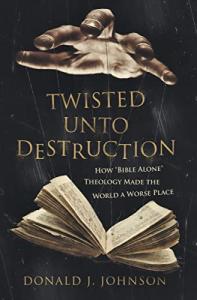
1054 and All That: A Lighthearted History of the Catholic Church by Karl Keating (2022)
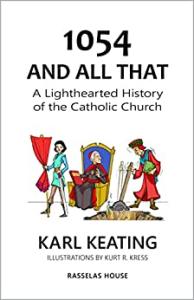
God allows many of His chosen souls to dip into the tide of worldliness only to claim them the more surely for His own when they have learned the limits of human enjoyment and its inadequate compensations. There is a great deal of the stuff of sanctity concealed in young hearts that show to the world nothing but giddiness. Boys and girls who love pleasure and seem to think of nothing but the gewgaws of the moment may have, at the same time, depths of seriousness within them not suspected by the rest of the world, and only at rare moments known to themselves. These are much more likely, when grace flashes the great truths into their souls, to turn to God and be true to Him than those pitiably comfortable people who take their pleasures as they come and merely as a matter of course.
Puggy almost certainly read those words and took from them encouragement in his hope that he too, despite his worldly interests, might be called to the priesthood.
Father Ed: The Story of Bill W.’s Spiritual Sponsor by Dawn Eden Goldstein (2022)
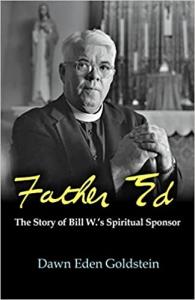
This collection of reflections by Pope Francis draws from the Angelus prayers, as well as some homilies, that fall on the holidays and Sundays of the year. Accompanying these reflections from the Holy Father are brief passages taken from early Church fathers—those who guided the first Christians—who offer food for thought and deepen Pope Francis’s words. Also, at the back of this book you will find papal sources and important dates to further enhance your reading experience. —Pierluigi Banna and Isacco Pagani
Reflections on the Sunday Gospel: How to More Fully Live Out Your Relationship with God by Pope Francis, Pope Matthew B.Sherry,(2022)
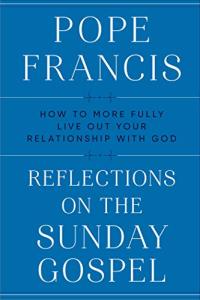
From childhood, most of us have been taught formulas of faith. These are accurate, time-honored expressions of what the Church believes and teaches, developed under the influence of the Holy Spirit. The most common summaries of the faith are the Nicene Creed and the Apostles’ Creed. As the Catechism reminds us, we believe not in formulas themselves but in the divine realities they express and that faith allows us to touch (CCC, 170). It is important for us to know and understand these formulas as a sure guide in our lives of faith. After all, we are a Church with over a billion members and two millennia of history. We are sinners and saints made up of people of every nation, tongue, and culture. Yet we confess “one Lord, one faith, one baptism,” to the glory of God and the salvation of our souls (Ephesians 4:5). We should never let a day go by without thanking God for our faith and asking him to increase it.
The Joy of Believing: A Practical Guide to the Catholic Faith –by Archbishop William. Lori,(2022)
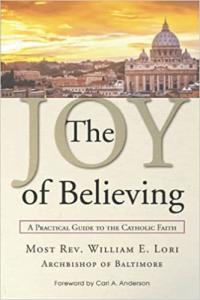
There is great variety found in the narratives offered by the contributors to this work. The stories come from priests and laity, men and women, Western and Eastern Catholics. For some, their study of theology led to their conversion to the Catholic Church; for others, their conversion to the Catholic faith led them to a life of study that developed into a theological vocation. In all cases, whether the study of theology was a cause or a consequence of conversion, they eventually found their home in Catholicism.
There have been many books published over the years that present the stories of individuals entering the Church.2 This is the first that focuses exclusively on theologians. Our aim was to highlight the particular challenges faced by theologians as they consider the veracity of Catholicism. Having greater exposure to theological perspectives and divergent schools of thought, the theologian is likely to be more aware of arguments running counter to the claims of the Catholic Church. One’s conversion and entrance into the Church must address these concerns, as for the theologian there are simply more questions on the intellectual front to be answered, and hence joining the Church is one, albeit momentous, step forward on the lifelong journey.
By Strange Ways: Theologians and Their Paths to the Catholic Church by Jonathan Fuqua, Daniel Strudwick,, , Jonathan Fuqua, (2022)
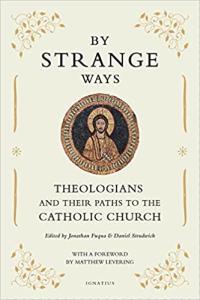
According to God’s book, there is “a time to weep and a time to laugh” (Ecclesiastes 3:4). The surest sign that our culture is in deep doo-doo is that we are increasingly sure that this is a time to weep and increasingly doubtful that it is a time to laugh. Another sign is that our Presidents no longer dare to use phrases like “deep doo-doo.” An even worse sign is that we are not allowed to laugh if we are in danger of being politically incorrect or unwoke or of “offending” anyone who has a paper-thin skin and a leather-thick heart.
This book almost didn’t exist. I was about to write a serious, heavy book entitled How To Save Western Civilization, as a sequel to my book How To Destroy Western Civilization and Other Ideas from the Cultural Abyss. But writing it was not making me happy, and reading it was not going to make anybody else happy either. And then I stopped just long enough for my guardian angel to squeeze through that tiny window of opportunity that I had opened up by my silence and to whisper this commonsense question into my subconscious: “Why not make them happy instead?” (Angels specialize in common sense.) I started thinking: Western civilization is neither healthy, happy, nor holy. Humor is all three. Humor is not only holy, it’s Heavenly. And if you are surprised to be told that humor is Heavenly, you need to read this book because you reveal your misunderstanding of both humor and Heaven. If you ask, “Is there laughter in Heaven?” my answer is: “You can’t be serious!”
Ha!: A Christian Philosophy of Humor by Peter Kreeft. (2022)
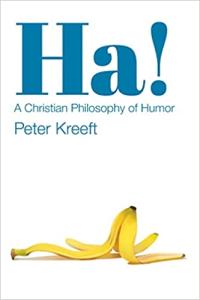
It may even be comforting to know that saints and Doctors of the Church (as well as your friendly neighborhood apologist) have doubts, so there’s nothing wrong with you having them, too. My goal in this book is to share how I’ve engaged this persistent adversary. I can’t teach you how to answer your own specific “inner skeptic,” because I’ve never met that person. People are unique, so what might be an insurmountable objection to one person will be just another apologetics trivia question for another. But if I show you as honestly as possible how I handle my own doubts, through a dialogue between myself and my “devil’s advocate,” then hopefully you’ll come away from this book with a rough plan of attack to face the challenges to the Catholic faith that hit you the hardest.
Devil’s Advocate- Facing My Inner Anti-Catholic by Trent Horn
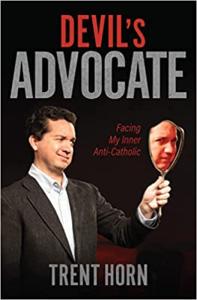
Life is so crazy. I used to think that I was doing it all wrong, that because I hadn’t figured out the secret code that everyone else seemed to know, God was not interested in helping me with my life. I grew up going to a First Baptist Church in a small, rural south Texas town. I was a good little Baptist girl until I met a boy who looked just like Donnie Wahlberg, who French-kissed me on the steps of that same First Baptist Church. At that point I left behind both my King James Bible that I received when I was eight years old and the idea that if I answered enough altar calls I would be normal. God went his way, and I went mine.
I eventually began therapy because the same boy who French-kissed me at the First Baptist Church in Kenedy, Texas, ended up marrying me in 2010 after my conversion to Catholicism. I had actually been Catholic all my life, despite attending the First Baptist Church, because I had been baptized Catholic as a baby. I also checked the “Catholic” box every time I was arrested, but that was it. In every other respect, I thought Catholics were nuts, and I wanted nothing to do with being Catholic. But in a Hail Mary effort to get Stacey to marry me when we were living together, I began the Rite of Christian Initiation of Adults (RCIA). My only goal was for him to marry me. God had other plans.
Our Lady of Hot Messes: Getting Real with God in Dive Bars and Confessionals by Leticia Ochoa Adams, (2022)
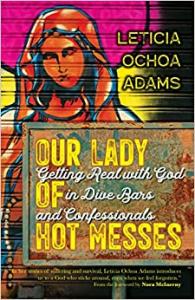
FICTION
King Louis departed home shortly thereafter, having been sent the news that his son was recovering. Spurred on by miracles such as this, the shrine continued to grow in popularity. Everyone noted the presence of The Regale. Like a lighthouse upon the darkling sea, it shone in the cathedral as a sign of hope and the presence of the saint. King Henry even had one of his jewelers fashion an angel of gold set at the base of the tomb, pointing towards The Regale. To the pilgrims who came and saw, its beauty trumpeted the power of the saint to dispense the mercy of Christ. Rome was more magnificent in size, but nothing was as beautiful as the jewel that welcomed the pilgrims to the shrine of St. Thomas of Canterbury. It was a place of healing and hope for nearly four hundred years until another king came and wiped it from the face of the earth, and The Regale disappeared.
BENEATH THE BISHOP’S BONES: A Vatican Archives Thriller (The Vatican Archives Series) E.R.Barr
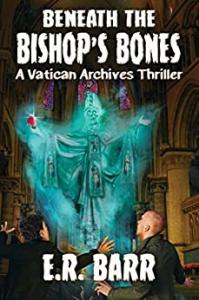
But what, one may ask, is the mark of a tale that withstands the erosion of time? The story that asks the right questions of the reader is the one that will never be lost. For this tale always asks: Is this rightor wrong? If right, why? If wrong, why? What are the results of these answers? How does that have any bearing on my life? What could I be doing better? What do I want to be – a hero or a villain? Science fiction and fantasy give the human mind the scope to probe the deeper questions of human nature.
In essence, these genres are the equivalent of Star Trek’s famous (or infamous) holodeck: readers get to journey with the characters, learning with and from them, without the need to truly risk their lives to gain wisdom. The point of these genres is less to “reach for the stars” and more to understand that mankind must reach for the stars the right way, lest he fall into the depths of Hell, never to return.
The Guardian Cycle, Vol.1: In Dreams and Other Stories by Caroline Furlong
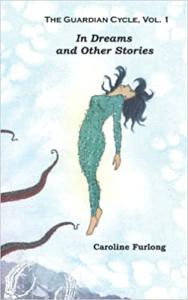
Rebecca Strand was sixteen the first time she saw her father kill a ghost.
“What do they want?” she asked. “These ghosts.”
“They’re filled with anger,” Papa said, sweeping the light back and forth across the harbor. “Some died with hatred smoldering in their hearts; some are furious they’re no longer living. These wish us harm. Keep your eyes on the water, Rebecca. We are not yet finished.”
Ghostlight by Kenneth Oppel
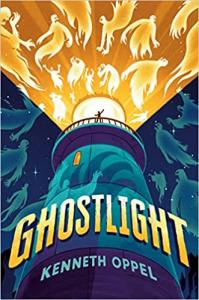
Welcome to year eight of The Best American Science Fiction and Fantasy! This volume presents the best science fiction and fantasy (SF/F) short stories published during the 2021 calendar year as selected by me and guest editor Rebecca Roanhorse.
I cannot remember a time when I wasn’t planted in the stacks of my local library. Books offered me that escape I so craved—worlds of magic, heroes and villains, wonder and possibility opened before me. Worlds so unlike my own. Later, I discovered something else besides refuge in my beloved books. I found conscience.It turned out that these imaginary worlds I so loved were not so different from my own after all. There were populated by bad men with too much power who often oppressed those weaker than they were. The stories they told were of people who struggled with difference and identity, the weight of duty versus love, the pull of ambition over family, and the trials of simply trying to survive in a world dead-set on their destruction.
The twenty stories I picked for this collection are exemplary pieces of imagination. Some are escapes into other worlds (as if escape were simple) offering a refuge in these times of pandemic, war, and the worldwide rise of fascism. Some simmer with radical revolution quite loudly, and others subvert our cultural mores more quietly, for what could be more revolutionary than (re)claiming one’s humanity, one’s capacity for love, one’s need for self. And they all—no matter how dark they might twist and turn—offer a glimmer of hope within.
The Best American Science Fiction And Fantasy 2022: by John Joseph Adams
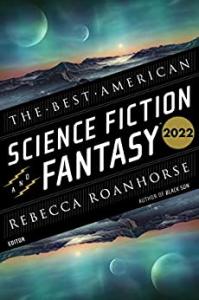
Dane, son of Desmond, stood at attention with four other warriors in a line on the plateau, all eyes on the brass door. The wind, consistently strong, whipped his hair in front of his face, blocking his eyes for a moment from the intense orange sunlight reflecting off the glossy crystal dome. While his heart hammered within him, he forced himself to remain composed. After all, he alone carried the Sword of Bonvida and wore the topaz shard on a leather cord around his neck.
Two heartbeats later, the oval doors of the dome creaked open and blue light streamed out, stretching across the plateau. Dane and the other warriors lowered themselves onto one knee. He struggled to keep his head up as he gazed upon Sofos, who appeared today as an enormous golden-brown bear. The bear? Sofos only turned into the bear if he was upset or angry. Normally Sofos would be a tall golden-brown stag with antlers that intertwined. On a rare occasion, he appeared as a beam of light, but the bear? Something was not right. Sofos stood for a moment atop the few
Bonvida’s Awakening by Christopher. D. Smith
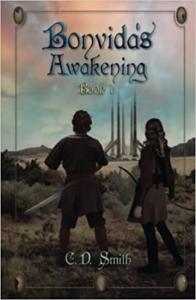
Non-Fiction
Bottom line: my mum is a huge reason I am where I am, even though she never pushed me in the direction of being an actor. I could have set my eyes on being a professional violinist, or ice hockey goalkeeper, or an extreme yoyoist. It wouldn’t have mattered to her which activity I ended up pursuing, but one thing’s for certain: whatever it was, Mum would have helped me achieve it.
Dad was and is the joker of the pack. He loves not to take himself too seriously and always finds some way to make a joke or slip in some sort of self-deprecating humour. Think Del Boy, Blackadder and Basil Fawlty rolled into one. It’s a trait I inherited from him and which I still use to this day. In my line of work, you often find yourself in situations where you meet new people and the ice needs breaking fast. I always try to exercise a little disarming humour, a little buffoonery, which is a technique I learned from my dad.
Beyond the Wand: The Magic and Mayhem of Growing Up a Wizard by Tom Felton | Goodreads
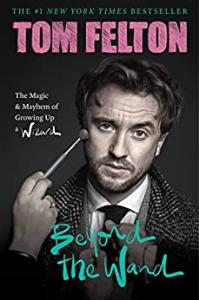
You aren’t born knowing you will die. Someone has to break the news. I asked my dad if it was him, but he can’t remember.
Some people remember being told: they have a moment they can pinpoint where life cleaved into before and after. They can remember the sound of a bird hitting the window, breaking its neck on the glass before the fall. They can recall the situation being explained to them as the limp, feathered body was peeled off the patio and buried in the garden, the dusty imprint of their wings lasting longer than the funeral. Maybe death came to you in the form of a goldfish or a grandparent. You might have processed mortality as much as you were able, or needed to, in the time it took for the fins to disappear in the swirl of a toilet bowl.
I don’t have one of those moments. I can’t remember a time before death existed. Death was just there, everywhere, always.
Maybe it began with the five dead women.
All the Living and the Dead: from Embalmers to Executioners, an Exploration of the People Who Have Made Death Their Life’s Work by Hayley Campbell
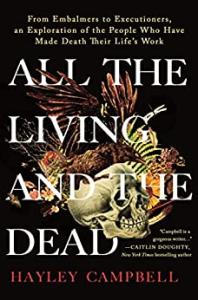
That’s the situation most beginning writers have found themselves in down the decades: you can’t write yet; first you have to learn the rules. And what a lot of rules there are—no split infinitives, no ending sentences with prepositions, no fragments, no use of “I” or “me,” your introduction must be shaped like this or that, there must be this many paragraphs in the body of your essay, your conclusion must have X number of sentences in it, your research paper must be this tall.
How much anxiety have we burdened would-be writers with before anything gets written, even before such niceties as ideas are introduced into the conversation? And what effect does this freight have on those who need to write?
Paralysis. Insecurity. Inadequacy on an industrial scale.
Someone or something—the culture, the educational system, parents, teachers—has so saddled young writers that they cannot communicate effectively with others in their native language. We have tied them in knots. Somewhere between their brains and the page or screen, something dreadful happens. Their fingers get all tongue-tied, and words stammer and stagger out disconnectedly. Or they rush headlong into stream-of-consciousness word salads where angels fear to tread. Or they throw linguistic spaghetti against the wall in hopes that something will stick, the results existing without, in the words of Agatha Christie’s Hercule Poirot, order or method. This situation is intolerable.
How did we get into this sorry state?
How to Write Like a Writer by Thomas Foster (2022)
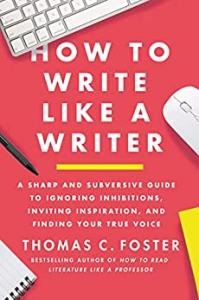
Van Beekum raced back to the boardwalk with his camera just in time to snap dozens of pictures. As those on board flashed Sieg Heil salutes and mugged for the camera, most on the boardwalk seemed amused.
Just then, another young man, who once fought for the South Vietnamese navy, was about to fire up the engine of the beat-up shrimp boat he’d just bought. Ever since arriving in Texas as a refugee five years earlier, after the collapse of his country, he had been saving every penny he’d earned assembling car radios in Houston in order to break into fishing. He was in a triumphant mood, about to take it out for the first time, when the Cherry Betty skulked past.
He looked up, wide-eyed. It looked as though there was a body hanging from a noose off the outrigger, its boots swaying four feet above the deck.
When Collins cleared the channel, he steered the Cherry Betty north, hugging close to the shoreline. As someone loaded a shell into the cannon, the Klan boat approached the dock jutting out from the home of the man who had become the greatest obstacle to their plans.
He was a highly decorated South Vietnamese colonel who’d spent the past two decades in battle. Ever since arriving in Texas, he’d become the leader of the Vietnamese shrimpers of Galveston Bay.
If the Klan could drive him from the coast, the rest might follow suit, and the White fishermen would have the waters to themselves again.
The Fishermen and the Dragon: Fear, Greed, and a Fight for Justice on the Gulf Coast by Kirk W. Johnson
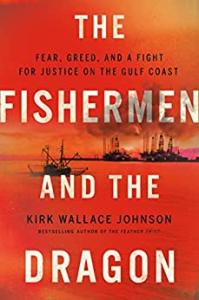
NATIONAL BESTSELLER • From the former United States Poet Laureate and New York Times bestselling author of Aimless Love, a collection of more than 125 small poems, all of them new, and each a thought or observation compressed to its emotional essence
“Whenever I pick up a new book of poems, I flip through the pages looking for small ones. Just as I might have trust in an abstract painter more if I knew he or she could draw a credible chicken, I have faith in poets who can go short.”—Billy Collins
You can spot a Billy Collins poem immediately. The amiable voice, the light touch, the sudden turn at the end. He “puts the ‘fun’ back in profundity,” says poet Alice Fulton. In his own words, his poems tend to “begin in Kansas and end in Oz.”
Now “America’s favorite poet” (The Wall Street Journal) has found a new form for his unique poetic style: the small poem. Here Collins writes about his trademark themes of nature, animals, poetry, mortality, absurdity, and love—all in a handful of lines. Neither haiku nor limerick, the small poem pushes to an extreme poetry’s famed power to condense emotional and conceptual meaning. Inspired by the small poetry of writers as diverse as William Carlos Williams, W.S. Merwin, Kay Ryan, and Charles Simic, and written with Collins’s recognizable wit and wisdom, the poems of Musical Tables show one of our greatest poets channeling his unique voice into a new phase of his exceptional career.
3:00 AM
Only my hand
is asleep,
but it’s a start.
Musical Tables: Poems by Billy Collins
